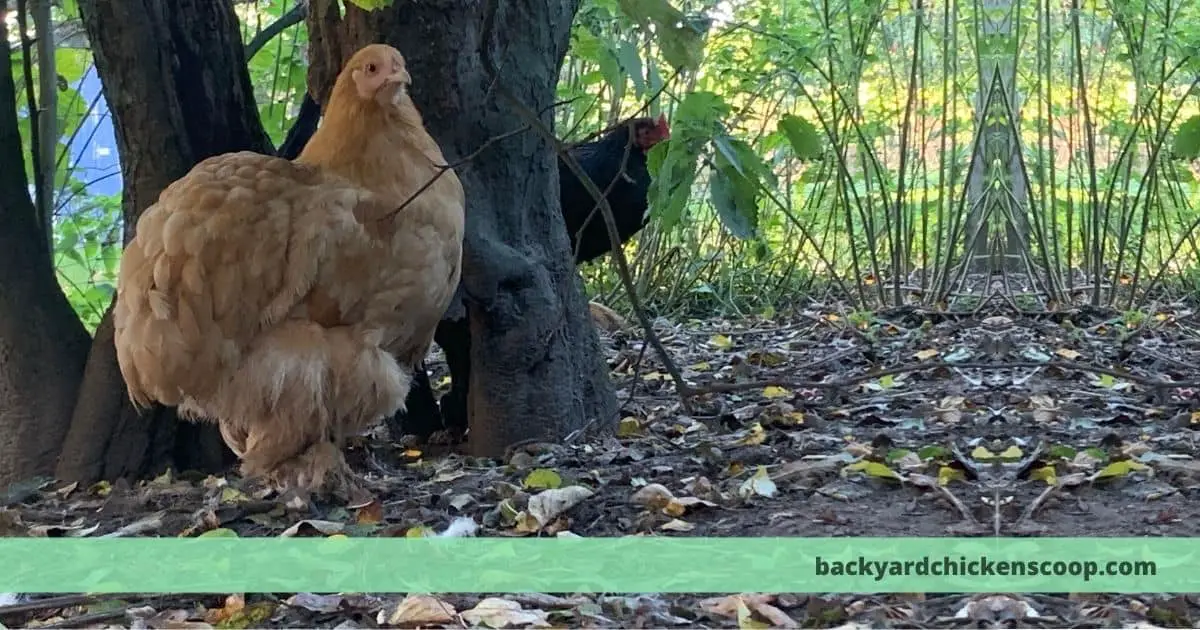It’s scary to find blood in chicken poop, especially if your chicken is pooping blood outright. So I called our veterinarian to learn a bit more and be prepared.
Key Takeaways
- Monitoring chicken poop is important for identifying potential health issues in your flock.
- Changes in the texture, colour, and structure of chicken poop can indicate underlying problems.
- Orange and red stringy poop is usually harmless and related to the shedding of intestinal linings or diet variations.
- Clear red blood in chicken poop can be a sign of coccidiosis, a serious parasitic disease that requires immediate attention.
- Black chicken poop can be caused by diet or indicate internal bleeding, which should be addressed by a veterinarian.
As we all know, keeping chickens in your backyard is very rewarding. You get a daily supply of fresh and clean eggs. Also, you have the satisfaction of knowing that those eggs were produced in a natural and healthy way under your own supervision. However, owning chickens also has a less glamorous side, to say the least.
One of the least pleasant things you have to do as a backyard chicken owner is regular monitoring and checking of chicken poop. However, it’s necessary if you want to keep your flock healthy and happy. If you’re not doing that already, make sure you start and make it a habit.
Keeping an eye on any changes in chicken excrement can help you figure out early that something is wrong.
Chickens can’t tell us when they feel ill. So, observing their behaviour and stool is the only way to notice warning signs that there may be a problem. Early recognition of health issues can save your bird and, sometimes, the entire flock by preventing the spread of disease.
Of course, when inspecting and handling chicken poop, you should always be careful and practice common hygiene precautions. Make sure that you’re wearing gloves and thoroughly wash your hands afterwards. Chicken poop can be very harmful to you and your family if you don’t handle it properly.
Droppings from your coop can cause Salmonella, E. coli, and Cryptosporidium infections and much more our veterinarian told me.
Ad: I thought you’d like these…


What does normal chicken poop look like?
Besides not being very fun, monitoring chicken poop is also not easy I think. When observing the chicken excrement, there are a couple of things you should pay attention to:
- Texture – whether it’s firm, foamy, or watery
- Colour of the poop
- Potential presence of blood in the poop
Poop structure and colour are good indicators of a potential disease.
However, this is sometimes problematic, as the line between normal and abnormal chicken poop is not always clear. Still, as an owner of backyard chickens, you should learn what regular chicken excrement looks like, Commonly, a healthy chicken will have a relatively firm poop. It should have a brownish or ash colour with a white cap from uric acid.
However, deviation from this standard doesn’t necessarily mean that your bird is sick. The colour and texture may change depending on the chicken’s diet.
Also, environmental factors such as high temperatures can influence how the poop looks. For example, if a chicken roams free around the backyard and eats a lot of grass or weed, it’s perfectly normal for the poop to be more green than usual.
The excrement can also change under some specific circumstances. If the chicken has a high-fibre diet, it will digest the food longer. It will store the food inside the cecum until all the nutrients are absorbed. The result will be the Cecal Poop which has a pudding-like structure and a particularly foul smell.
When a hen is a broody, it will also produce an irregular stool. It’s larger, harder, and smellier than the regular poop. Still, this is completely normal and nothing to be alarmed about.
Learning what a change in the colour or structure of chicken poop means is essential for you to be able to properly care for your flock. Below, I’ll lay out some basic information on what the appearance of the stool can tell you about the chicken’s condition.
| Poop Color | Possible Causes |
|---|---|
| Orange | Shedding of intestinal linings or diet variations |
| Red Stringy | Shedding of intestinal linings or red granite grit |
| Clear Red Blood | Coccidiosis or other serious health issues |
| Black | Dark-colored foods, excessive proteins, or internal bleeding |
You also need to know…
Essentials
Orange chicken poop
Orange chicken poop on your coop floor or in the backyard is a relatively common occurrence. However, finding orange droppings often scares chicken owners, especially those who are rather inexperienced. Nevertheless, this type of poop variation is usually nothing you should concern yourself with.
In rare cases, orange chicken poop may point to coccidiosis. But, the more likely reason is the shedding of intestinal linings. This happens from time to time when the bird releases the mucus membranes covering the intestinal wall. It may sound alarming but it’s actually harmless and benign as the intestinal linings regenerate.
Just make sure that the colour is definitely orange and that there is no blood in the stool as it may be a sign of a more serious issue.
Red stringy chicken poop
Sometimes the poop your chickens leave behind them will feature small red or pinkish stringy pieces. The dropping may contain a small amount of these pieces, rarely more than ten. Because of their appearance, some chicken owners mistake these small strings for worms. While internal worms are dangerous and require immediate treatment, chances are that the issue is much less serious.
These small red pieces are actually parts of the chicken’s intestinal lining. Every once in a while, the chicken will slough their intestinal linings and poop them out together with faeces. This way, they create room for linings regeneration, which is a perfectly healthy and normal process.
Another potential culprit responsible for red stringy chicken poop is the red granite grit. I hear many chicken owners give grit to chickens along with their feed to improve their digestion. The red colour is used to motivate the birds to peck at the grit and sometimes it may colour their stool.
If you’re using red granite grit in your chickens’ diet, try withholding it for a couple of days. If the red string stuff disappears from the poop, then you’ll know the reason for this unusual poop appearance. After you’ve established that there’s no serious problem behind the red stringy poop, you can begin using the grit again.
Clear red blood in the poop
While the orange or occasionally red excrement is nothing to worry about, seeing clear red blood in your chick’s poop should sound the alarm. The reason for worry is that bloody poop is a common symptom of coccidiosis. Coccidiosis is a very serious parasitic disease that attacks the chickens’ intestinal lining.
It’s caused by a single-cell parasite called Coccidia which can also attack other poultry and livestock.
Coccidiosis causes chickens to dihydrate, suffer from malnutrition, and, if not treated on time, lead to death. An even bigger issue is that it’s highly contagious and can spread rapidly and efficiently, quickly infecting the whole flock.
Still, Coccidiosis is treatable, and that’s one of the main reasons why you should regularly check your chickens’ poop.
Once you notice chicken bloody stools, immediately take measures to stop the disease from advancing and spreading. If you can identify the individual chicken pooping blood, you should isolate it and separate it from the rest of the flock right away.
Especially if the blood in the poop is accompanied by other Coccidiosis symptoms. These may include lethargy, loss of appetite, ruffled feathers, or pale comb and skin.
Bloody poop can sometimes have a watery form, or the blood can be mixed with normal grey or brownish matter. The amount of blood in the excrement indicates how serious the condition is and how far the Coccidiosis has advanced.
The more blood you see, the more reasons for concern. Blood commonly appears in the poop on the 4th day of the infection. By the 6th day, its amount will increase significantly turning the stool into severe diarrhoea.
The best course of action when you notice clear red blood in the poop is to immediately contact the vet. You may take the faecal sample for analysis, so the vet can set the diagnosis and suggest the treatment. The most common drug for Coccidiosis treatment is Corid, although our vet recommends other coccidiostats, such as Toltrazuril.
Usually, after the therapy, you should add vitamin supplements to the chickens’ diet. This will help them replenish the lost vitamins.
Some natural remedies can also help, including vinegar, garlic, or yoghurt. Although the recovery won’t be successful without prescribed drugs, these organic remedies will help chickens build up their immunity.
At this point, I’m sure you need the free Chicken Disease Cheat Sheet
…
What does black chicken poop mean?
The black chicken poop is most likely related to their diet. If the chicken has been eating dark-coloured foods, such as blackberries, black apples, or charcoal, then its excrement can take on black colour. Another possible reason is an excessive amount of proteins in your chicken feed.
When you suspect that this is the reason, you should tweak your feed formula. Also, brooding hens can sometimes drop black poop. It will usually have a watery structure and is a result of the hen not eating in a while.
However, if you’re certain that your chicken didn’t have access to any dark-coloured food and isn’t brooding, then you may have a more serious problem on your hands. Similar to other birds and also mammals, black poop can be a sign of internal bleeding.
If this is the case, the bleeding has most likely happened in the upper part of the digestive system. The black colour indicates that the blood had time to coagulate. Bleeding that happens near the end of the intestinal tract results in the bright red colour of the chicken poop.
Internal bleeding may be the consequence of trauma, bacterial infection, or the presence of worms. In any case, you should contact the vet as soon as possible, since there’s no natural remedy for internal bleeding.
I’m very thankful that our vet took the time to provide me with this information. Then again, we do she her quite regularly with as many birds as we have.


